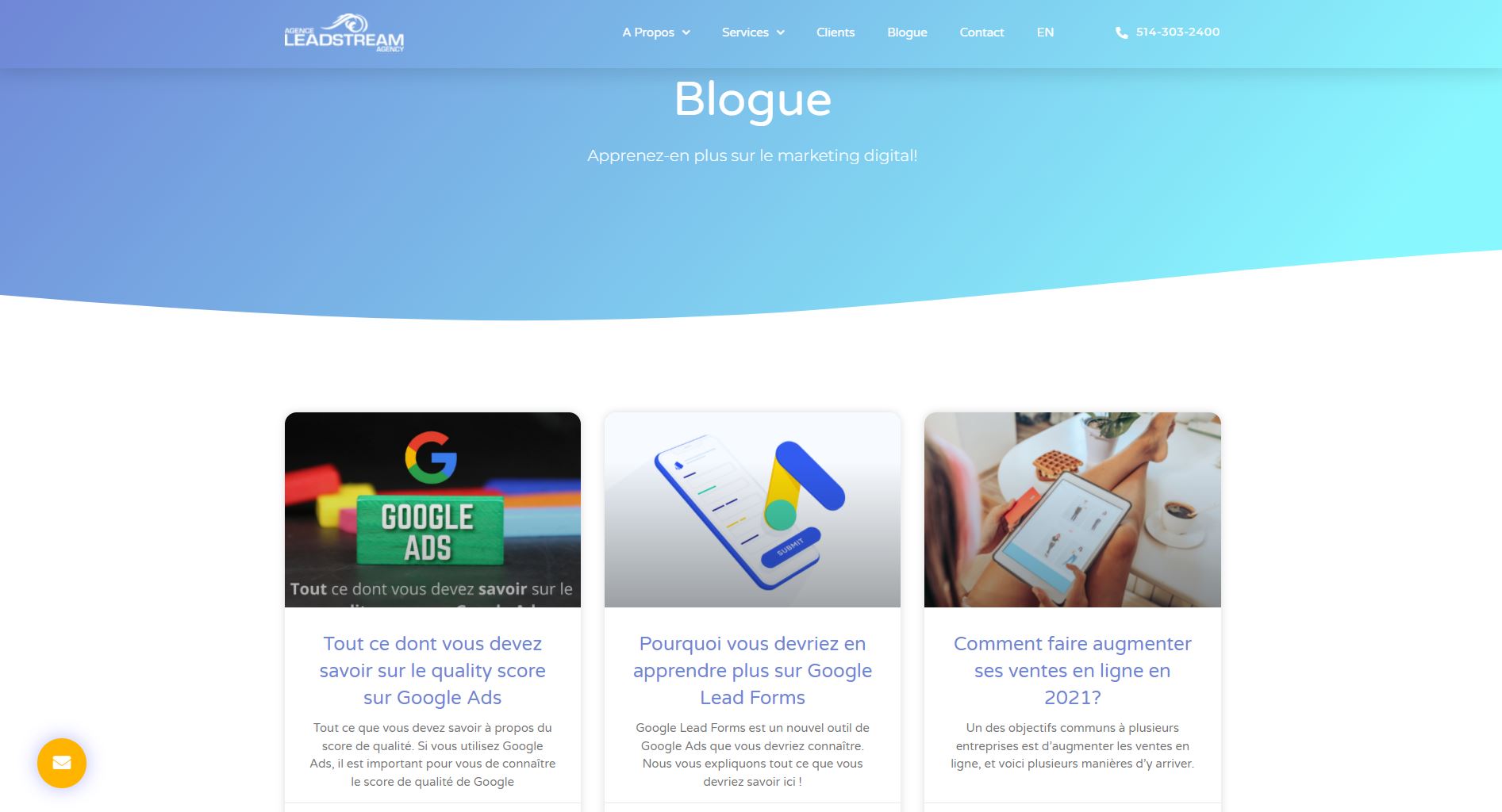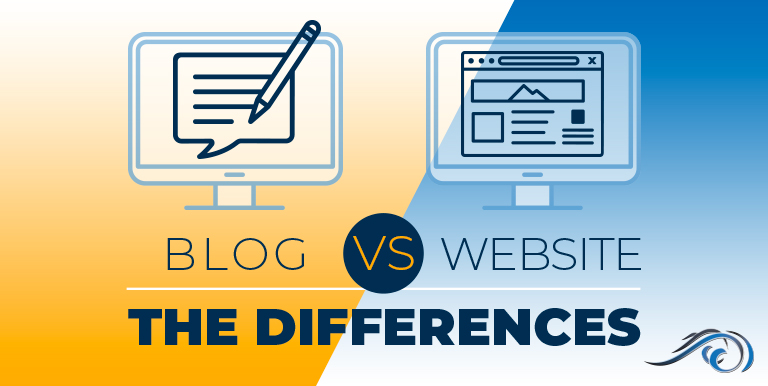The differences between a blog and a website
As you likely already know, a solid web presence is essential to getting more clients. However, what may be less clear, is the difference between various forms of web content like, for example, a blog vs a website.
It may be difficult for neophytes to have a clear understanding of all the content marketing jargon.
Does this sound like you?
Are you wondering if creating a blog vs a website is more profitable for you?
LeadStream, your SEO agency in Montreal, helps you clarify the differences between a blog and a website below.
What is a blog?
Let’s begin with what a blog consists of.Blogs have been around for a long time. At the beginning, they were used as a sort of online personal journal. This is still the case for several individuals, who use this web tool as a platform on which they can freely express themselves on several different subjects or allow their creativity to soar.
Online newspapers have also found the blog format to be a great one for their publications, as they appear in reverse chronological order (most recent to oldest) and thus allow users to get the latest news first.
But how does this apply to your business?
We’re getting there.
After individual bloggers and newspapers, blogs have turned out to be a real gold mine for businesses. Sometimes called “news”, “current events” or even simply “postings”, the blog is often used as a section on the business website itself. It allows for the business to quickly and efficiently publish accessible information about various different subjects, like:
- The latest news or events in relation to your organisation ;
- On a wider scale, the latest news in the industry ;
- Expert advice or useful information ;
- Interviews with partners or ambassadors ;
- And much more !
The blog is mostly composed of articles, but is also often enriched with internal links (leading toward another page on your own website) or external links (leading towards an outside source) as well as pictures or images.
In short, the blog is a section of your website where you will find regular postings about your business or topics related to the field of your expertise.

The advantages of a blog
Regular postings, in the shape of a blog, offer several benefits. Firstly, they will allow you to form a community around your business or association, and to share your passion and your expertise.
But what is the real advantage for you?
This can be summarized in three letters: SEO.
To explain things simply, SEO generates traffic to your website through search engines. For this to be efficient, a lot of factors are essential, like for example: keywords and quality content. The more you use naturally keywords that are frequently being typed in by users, and the higher the quality of your content, then the greater visibility you will have, as you will appear more often in search engine results, and at the top of the list.
When you type in a search in Google, you generally only visit the results on the very first page. This is where you want your business to be, so that you can generate visitor traffic to your own website. This is what blogs can do for you!
This is also how you attract what we call “traffic without a brand”, which refers to visitors who are not yet familiar with your business, but who may be looking for the products or services your business offers.
To make things clearer, let’s pretend that your business sells downhill skis.
A possible blog for you could be about “How to choose the right skis?”. Not only have you managed to integrate keywords that will ensure that you show up more often in search engines, you are also demonstrating that you are an expert, which will also attract visitors who are ready and willing to make a purchase.
You are increasing notoriety and, at the same time, transforming visitors into potential clients!
However, SEO answers to very precise rules and it is recommended to be accompanied by a good team or good knowledge to obtain results.
What is a website?
The main difference between a blog and a website is the structure itself. While the blog is a series of articles that appear in reverse chronological order, the website is a platform that is generally more complex and static.
A website’s webspace refers to its structure and is, in short, the view of your website as seen by the client. It contains pages that are made of headlines and subheadings, which allow your visitor to find what he/she is looking for. For example, your webpages will generally include:
- A home page
- One or several pages about services/products
- An “about” page
- A contact page
These pages will vary depending on business, and will be subdivided in different ways. With time, the website goes through little changes, except when new products are added, or when promotions or contests
change, etc.
Overall, there will be more graphic content on a website than on a blog. As mentioned, the website must allow the visitor to easily find what he/she is looking for. For this reason, several techniques are often
used on a website, such as UX writing.
In summary, UX writing is a writing technique that is focused on the user’s experience. Sentences will be short and concise. Information is clear, the website is user friendly. These are the principles on which a UX based website is built.
Above all, you must view your website as a virtual image of what your business represents. This is why it is important to create a platform that is representative of you and your business and, furthermore, that attracts your target audience.

The advantages or a website
A website is not only advantageous, it is literally a must in today’s industry. Think about it: what is the very first thing you do when searching for a product or service?
In most cases, your first reflex is to head straight toward search engines; this is also what your clients will do. Whether they are looking for your business specifically or keywords that are related to your products and services, if you don’t already have a website, chances that they will find you are very slim!
Let’s take a simple example: you want to try out a new restaurant tonight and you pop that in as a search, on your favorite search engine. Results automatically appear in Google Maps. You hesitate between two restaurants, only to find that one of them does not have a website, which means that you do not have online access to menu or prices. Are you more likely to choose the restaurant with a website? Or dive into the unknown?
Your website is, in a way, the same as a restaurant menu. A welcoming and well-designed platform, where your products and services take center stage, is sure to inspire confidence in your future clients. Increase your web visibility will also allow you to grow your client base much more rapidly.
Not only is it important to have a website, it is also essential that it be user friendly. Your client must be able to navigate easily and find whatever he or she is looking for quickly. Your website is your online presence, your image, and thus represents you. It is crucial that it both match who you are, and attract your target audience.
If you sell products, adding an online store is another key element in allowing you to never lose a client. Today, many people only want to make purchases online. This means you should be putting all the odds in your favor!
As you can see, there are several differences between a blog and a website. There is also a common characteristic: they will both help you with SEO. Search engines are becoming more sophisticated every single day, and know how to recognize quality content!
How is a blog different from a website?
As previously mentioned, a website allows you to tell people about your products and services. It allows your client to discover what you have to offer and, in certain cases, to purchase your products.
The blog works differently; we’ll get back to this.
The blog can be an independent website like, for example, by using a WordPress platform. However –and this is where things get very interesting for businesses- it is also integrated into the website itself.
The difference between the blog and the website is that the blog does not share content on static pages. Rather, they are articles that appear in reverse chronological order, meaning from most recent to oldest.
That’s not all: apart for the graphic display, the blog and website are also different in terms of usage and content.
Usage
There are several ways to use a blog. Sometimes it will be designed and monitored by a single person, as is often the case for personal blogs.
Let’s be honest: as a business owner, you most likely lack the time to dedicate yourself to this. Eventually, inspiration may also wane.
This is where SEO agencies come in. The blog is often used alongside your website, and can be handed to specialized writers who work hand in hand with the marketing team.
When used together, the blog allows to feed the website and keep it alive. More importantly, you should know that when it comes to the blog, frequency is key. Believe it or not, Google sees your consistency and repays it tenfold. Publishing regular articles will allow you to always show up higher in the results, as long as you respect other SEO rules, obviously.
Sometimes the blog can also contain a comment section, allowing you to interact with your visitors. They can then express themselves freely or ask you direct questions, which in turn creates positive interaction.
Content
The main part of the blog is an article. It can be short (300-350 words), medium length (700- 1000 words) or even be lengthy (over 2000 words). When it comes to today’s trends, however, they show that longer contents generally spark more interests in search engines than shorter contents do.
In order to maintain the reader’s interest, the blog will utilize several elements:
- Illustrations
- Tables and graphs
- Lists
- Sometimes videos
- Etc.
You might be wondering what to talk about. Well, that simply depends on your business.
Informative blogs will often be used by businesses who want to demonstrate their expertise and direct clients towards their products. For example, a car dealership could publish a blog about a specific car model or a blog that compares two different models in great detail.
A pet shop could offer advice on the best cat litter for your cat. A clothes company could tell you all about today’s trends. And so on!
Subjects are varied, but they share one thing in common: all blogs are geared toward satisfying readers, and also to bring answers to their questions. In order for users to find your content, it must have been optimized for search engines as well.
What would be the point in creating exceptional content if, in the end, no one can find it?
Starting your website or your blog?
So, website or blog… or both? As you have probably understood, the combination of both is the winning strategy, in order to attract new visitors and gain more clientele.
To create a blog and increase visitors visits to you website, call upon the LeadStream team. We are an SEO team that can help you get the tangible and quantifiable results you are looking for.
Blogs and websites are an important part of your web strategy, but the marketing content is much bigger than this, and we are ready to steer you in the right direction.
Are you ready to take the plunge?
Contact us via the form below for advice on your content strategy!



